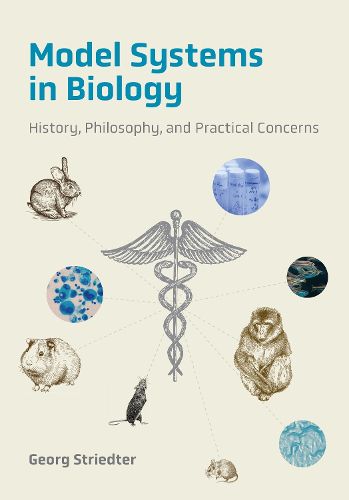Readings Newsletter
Become a Readings Member to make your shopping experience even easier.
Sign in or sign up for free!
You’re not far away from qualifying for FREE standard shipping within Australia
You’ve qualified for FREE standard shipping within Australia
The cart is loading…






How biomedical research using various animal species and in vitro cellular systems has resulted in both major successes and translational failure.
In Model Systems in Biology, comparative neurobiologist Georg Striedter examines how biomedical researchers have used animal species and in vitro cellular systems to understand and develop treatments for human diseases ranging from cancer and polio to Alzheimer’s disease and schizophrenia. Although there have been some major successes, much of this translational research on model systems has failed to generalize to humans. Striedter explores the history of such research, focusing on the models used and considering the question of model selection from a variety of perspectives-the philosophical, the historical, and that of practicing biologists.
Striedter reviews some philosophical concepts and ethical issues, including concerns over animal suffering and the compromises that result. He traces the history of the most widely used animal and in vitro models, describing how they compete with one another in a changing ecosystem of models. He examines how therapies for bacterial and viral infections, cancer, cardiovascular diseases, and neurological disorders have been developed using animal and cell culture models-and how research into these diseases has both taken advantage of and been hindered by model system differences. Finally, Striedter argues for a big tent biology, in which a diverse set of models and research strategies can coexist productively.
$9.00 standard shipping within Australia
FREE standard shipping within Australia for orders over $100.00
Express & International shipping calculated at checkout
Stock availability can be subject to change without notice. We recommend calling the shop or contacting our online team to check availability of low stock items. Please see our Shopping Online page for more details.
How biomedical research using various animal species and in vitro cellular systems has resulted in both major successes and translational failure.
In Model Systems in Biology, comparative neurobiologist Georg Striedter examines how biomedical researchers have used animal species and in vitro cellular systems to understand and develop treatments for human diseases ranging from cancer and polio to Alzheimer’s disease and schizophrenia. Although there have been some major successes, much of this translational research on model systems has failed to generalize to humans. Striedter explores the history of such research, focusing on the models used and considering the question of model selection from a variety of perspectives-the philosophical, the historical, and that of practicing biologists.
Striedter reviews some philosophical concepts and ethical issues, including concerns over animal suffering and the compromises that result. He traces the history of the most widely used animal and in vitro models, describing how they compete with one another in a changing ecosystem of models. He examines how therapies for bacterial and viral infections, cancer, cardiovascular diseases, and neurological disorders have been developed using animal and cell culture models-and how research into these diseases has both taken advantage of and been hindered by model system differences. Finally, Striedter argues for a big tent biology, in which a diverse set of models and research strategies can coexist productively.